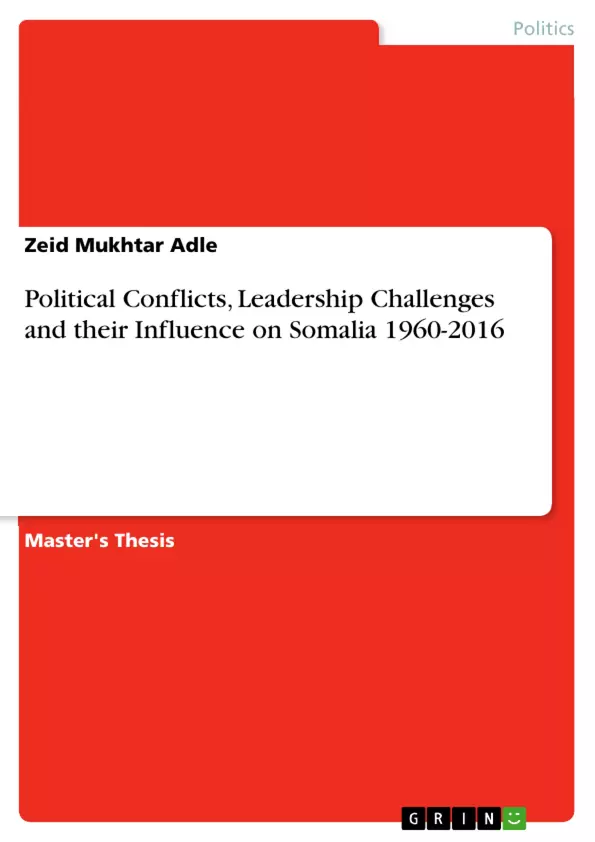
Political Conflicts, Leadership Challenges and their Influence on Somalia 1960-2016
Masterarbeit, 2017
98 Seiten, Note: 4
Leseprobe
Inhaltsverzeichnis (Table of Contents)
- Chapter 1 Introduction:
- 1.1: Introduction:
- 1.2: Research Question
- 1.3: Aims and Objectives:
- 1.4: Review of Literature
- Chapter 2 Influences on Leadership:
- 2.1 Leadership Traits
- 2.2 Factions and clans
- 2.3 Islam & Al-Shabaab.
- 2.4 Planning out the solution:
- Chapter 3: The help from the UN and its effects.
- 3.1: United Nations and Peacekeeping Operation:
- 3.2 Factors affecting the mission
- 3.3 Conclusion
- Chapter 4 Practical Ways of Reconciliation:
- 4.1: What went wrong?
- 4.2 Clan Identities
- 4.3: Conflict-Sensitive Assistance in Somalia
- 4.4 Factors that can help:
Zielsetzung und Themenschwerpunkte (Objectives and Key Themes)
The study aims to explore the historical context of political conflicts and leadership challenges in Somalia, specifically analyzing their impact on the Somali society. It seeks to identify key factors contributing to the instability and propose potential solutions to mitigate ongoing conflict. This research uses qualitative methodology, drawing data from diverse sources such as scholarly articles, books, and online archives.
- Influence of leadership on Somali political conflict
- Impact of clanism and tribalism on the development of Somalia
- Role of international actors, particularly the UN, in addressing Somali conflict
- Exploration of practical reconciliation approaches for the Somali people
- Examination of historical factors contributing to ongoing conflict
Zusammenfassung der Kapitel (Chapter Summaries)
Chapter 1: Introduction
This chapter introduces the research's main aim, which is to explore the impact of leadership on the political conflicts and the social fabric of Somalia. It examines the history of Somalia, focusing on the leadership struggles, political unrest, and the influence on its people. The chapter delves into the effects of traditional "clanism" and its role in shaping the political landscape and social structures. It also explores the importance of education and its potential for national development.
Chapter 2: Influences on Leadership
This chapter delves deeper into the factors influencing leadership in Somalia. It analyzes leadership traits, explores the role of factions and clans in the power dynamics, and investigates the impact of Islam and the Al-Shabaab group. The chapter further explores potential solutions for addressing the challenges posed by these factors.
Chapter 3: The help from the UN and its effects.
Chapter 3 explores the role of the United Nations and its peacekeeping operations in Somalia. It examines the factors influencing the effectiveness of these missions and analyzes their impact on the conflict resolution process. The chapter concludes by discussing the limitations and challenges faced by the UN in achieving lasting peace in Somalia.
Chapter 4: Practical Ways of Reconciliation
This chapter focuses on practical approaches to reconciliation in Somalia. It analyzes the root causes of the conflict, explores the significance of clan identities in the context of reconciliation, and examines the role of conflict-sensitive assistance in addressing the needs of the Somali people. The chapter also identifies factors that can contribute to a more peaceful and stable future for the country.
Schlüsselwörter (Keywords)
The key themes and concepts explored in this study include Somali political conflict, leadership challenges, clanism, tribalism, conflict resolution, international intervention, United Nations peacekeeping, reconciliation, and the impact of historical events on the development and stability of Somalia. It also examines the role of Islam and the Al-Shabaab group in the context of the ongoing conflict.
Frequently Asked Questions
What is the focus of the study on Somalia (1960-2016)?
The study explores the history of political conflicts, leadership challenges, and their profound influence on Somali society and infrastructure.
How does "clanism" affect Somali politics?
Traditional clanism and tribalism have played a central role in power struggles, often crippling national development and shaping the political landscape.
What role has the UN played in the Somali conflict?
The United Nations has conducted various peacekeeping operations, though their effectiveness has been limited by factors discussed in Chapter 3.
What is the impact of Al-Shabaab on Somali leadership?
The group is analyzed as a major influence on leadership dynamics and security challenges within the country.
What practical solutions for reconciliation are proposed?
The study suggests conflict-sensitive assistance, formalizing the education system, and addressing the root causes of clan identity disputes.
Details
- Titel
- Political Conflicts, Leadership Challenges and their Influence on Somalia 1960-2016
- Hochschule
- Gazi Üniversitesi Ankara (Social science)
- Veranstaltung
- Political and Social science
- Note
- 4
- Autor
- Zeid Mukhtar Adle (Autor:in)
- Erscheinungsjahr
- 2017
- Seiten
- 98
- Katalognummer
- V376849
- ISBN (eBook)
- 9783668543515
- ISBN (Buch)
- 9783668543522
- Dateigröße
- 767 KB
- Sprache
- Englisch
- Schlagworte
- political conflicts leadership challenges influence somalia
- Produktsicherheit
- GRIN Publishing GmbH
- Preis (Ebook)
- US$ 39,99
- Preis (Book)
- US$ 51,99
- Arbeit zitieren
- Zeid Mukhtar Adle (Autor:in), 2017, Political Conflicts, Leadership Challenges and their Influence on Somalia 1960-2016, München, Page::Imprint:: GRINVerlagOHG, https://www.diplomarbeiten24.de/document/376849
- Autor werden
- Ihre Optionen
- Vertriebskanäle
- Premium Services
- Autorenprofil
- Textarten und Formate
- Services für Verlage, Hochschulen, Unternehmen

- © GRIN Publishing GmbH.
- Alle Inhalte urheberrechtlich geschützt. Kopieren und verbreiten untersagt.
- info@grin.com
- AGB
- Open Publishing
Der GRIN Verlag hat sich seit 1998 auf die Veröffentlichung akademischer eBooks und Bücher spezialisiert. Der GRIN Verlag steht damit als erstes Unternehmen für User Generated Quality Content. Die Verlagsseiten GRIN.com, Hausarbeiten.de und Diplomarbeiten24 bieten für Hochschullehrer, Absolventen und Studenten die ideale Plattform, wissenschaftliche Texte wie Hausarbeiten, Referate, Bachelorarbeiten, Masterarbeiten, Diplomarbeiten, Dissertationen und wissenschaftliche Aufsätze einem breiten Publikum zu präsentieren.
Kostenfreie Veröffentlichung: Hausarbeit, Bachelorarbeit, Diplomarbeit, Dissertation, Masterarbeit, Interpretation oder Referat jetzt veröffentlichen!
- GRIN Verlag GmbH
-
- Nymphenburger Str. 86
- 80636
- Munich, Deutschland
- +49 89-550559-0
- +49 89-550559-10
- info@grin.com
-









